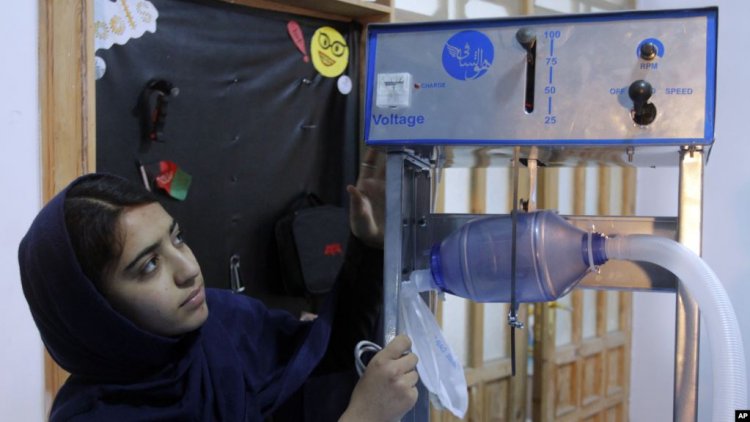Contact Admission
International Collaboration
Teenage Engineers in Afghanistan Use Car Parts to Build Ventilators

Young female engineers in Afghanistan are using old car parts to develop ventilators to treat coronavirus patients.
The girls - ages 14 to 17 - are members of a prize-winning robotics team. They say they are on a life-saving mission. Somaya Farooqi is among them.
“If we even save one life with our device, we will be proud,” she said.
On most mornings, Farooqi’s father drives the girls to a workspace outside the western Afghan city of Herat, where they live. The trip takes careful planning to avoid police roadblocks set up to enforce stay-at-home orders for people in Herat.
There are a limited number of special permits to avoid the police stops, but Farooqi’s father has not been able to get one. The girls say they have to work fast so they are willing to take risks to travel outside the city. “We are concerned about security driving out of the city,” Farooqi said.
But there is no other way, she said, adding, “we have to try to save people’s lives.”
The team’s efforts would have been unthinkable in Afghanistan just a generation ago. Under Taliban rule in the late 1990s, girls were not permitted to even go to school. Farooqi’s mother was forced to leave school in the third grade.
After the United States invaded Afghanistan in 2001, girls were permitted to return to schools. The struggle to gain equal rights for females continues and the young engineers push forward with their work. “We are the new generation,” Farooqi said. “We fight and work for people. Girl and boy, it does not matter anymore.”
Afghanistan is facing the coronavirus crisis with limited supplies of medical equipment. The country has just 400 ventilators for its population of more than 36 million. So far, the country has reported more than 1,000 cases of the virus, and about 30 deaths. But experts say the number of cases are likely much higher since virus testing remains very limited in the country.
More coronavirus cases have been reported in Herat province because it sits close to the border with Iran, which has experienced a severe spread.
The local spread of the virus led Farooqi and her team to try to come up with a medical solution. At their workspace, the team has experimented with two different designs. One of them is based on plans developed by engineers at America’s Massachusetts Institute of Technology (MIT).
Parts used to build the ventilators include the motor of a small car device, car batteries and sets of oxygen pumps. A group of auto repair experts helps the team build the ventilator structure.
Daniela Rus, a professor at MIT, welcomed the team’s quick development efforts. “It will be excellent to see it tested and locally produced,” she said.
Afghan businesswoman Roya Mahboob founded the robotics team and raises money to empower girls in technology. She says she hopes Farooqi’s group will finish building a working model by May or June. The model will then be tested by the country’s health ministry, at first on animals, a government spokesman said.
Somaya Farooqi says her team felt the need to seek a solution to help people at home. “Afghans should be helping Afghanistan in this pandemic,” she said. “We should not wait for others.”
I’m Bryan Lynn.
Other news
- May 19 morning: Vietnam has 31 new COVID-19 cases, the Ministry of Health consults with a 'record' of 20 severe cases ( 08:51 - 19/05/2021 )
- May 06, an additional 8 cases COVID-19 at the Tropical Disease Hospital Central ( 10:10 - 06/05/2021 )
- This morning 5-5, Vietnam has no new cases of COVID-19, more than 602,000 more globally ( 14:29 - 05/05/2021 )
- On the morning of May 3, Vietnam did not record a new case of Covid-19 infection ( 07:56 - 03/05/2021 )
- UPDATE KNOWLEDGE ON HOW VACCINE COVID-19 WORKS ( 10:28 - 20/03/2021 )
- On the morning of March 1, no cases of COVID-19, 210 patients undergoing treatment were negative ( 08:28 - 01/03/2021 )
- On the morning of February 25, there was no new case, a patient with very severe COVID-19 ( 08:35 - 25/02/2021 )
- How to wear a Mask properly ( 09:01 - 22/02/2021 )
- 39 provinces and cities let students stop going to school ( 09:47 - 17/02/2021 )
- COVID-19 'brutally exposes' the technological gap ( 15:29 - 30/01/2021 )


















